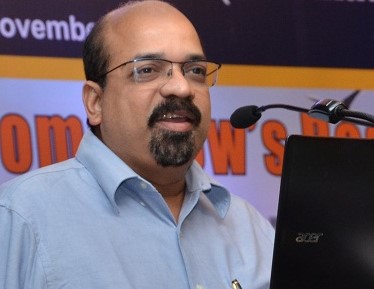Tax Experts react to formal approval of GST laws by GST Council
GST Council, led by FM Arun Jaitley, granted formal approval to all 5 draft GST legislations i.e. CGST, IGST SGST, UTGST and Compensation Bills, which shall now be taken to Cabinet for approval before introducing in Parliament. The GST Council has also capped Cess on demerit goods at 15%. With this, GST inches closer to July 1 rollout deadline.
Tax Experts react to this significant development.
It is a red letter day in the ambit of Indian tax jurisprudence. Thus far, we have had uniform tax laws through various central legislations, both in direct and indirect taxes, but sales tax / VAT always remained outside the ambit due to plurality of thought process resulting in multiple legislations.
The world's largest democracy can stand up in pride today to proclaim that India is also now a very matured democracy. Notwithstanding the irreconcilable political differences and the decision of Courts enlarging the scope of State autonomy, the nation and its leaders cutting across party lines have achieved the cherished dream of a unified economic India; a dream by our Constitution makers.
Hope this uniform tax law be the forerunner and the trendsetter for our leaders to converge towards a Uniform Civil Code.
The GST Council achieved the seemingly impossible - a consensual law for GST. History will place these events beginning with the constitutional amendment and ending with the five legislations to enable GST as watershed events in the economic and legislative narrative of our nation. To Mr Jaitley and every person from the Centre or the States who enabled the process, we are beholden.
There is still much to do, and, the detailing of the law, rates and procedure will be the immediate next steps. The preparedness of industry seems to be a generation behind the preparedness of the Government. The onus is now on the 9 million plus potential assessees to make the generational leap to migrate to GST - this is the greatest challenge to the 1st July, 2017 roll out.
All forces within industry, Government and the professional community will have to converge to support the migration of the MSME's into GST, as without them being on boarded completely, the economic dividend of a GST is at risk of being diluted, if not defeated.
Time will tell whether the positive fall outs of GST, the benefits, the advantages, the simplification of operations, the ease of paying taxes, the upward push to GDP, the improvement of ethics and integrity are excessively hyped or are real. But, even if a part is achieved it will be a great positive and it is now clear that it will be achieved. India Inc. recognises and appreciates this extraordinary achievement of making GST, a reality in a federation as big and diverse as India. Congratulations to the Governments, the political leaders, the administrations at the Centre and the States and all who have contributed in this herculean effort.
With GST Council granting its formal approval to CGST, IGST SGST, UTGST and Compensation laws, there is a clear possibility that GST would come into force from July 1, 2017. It is commendable that GST Council, which was created as per Article 279A of the Constitution of India only in the month of September 2016, has met multiple times in quick succession and achieved this significant milestone. It is indeed a high point in co-operative federalism.
Conceptually, the administration of GST is an unusual empowerment based on the principle of agency i.e. the revenues of the consumption State being administered by the authorities of the origin State. Undoubtedly, GST will be beneficial to many SMEs carrying on operations in a single State. With only two indirect tax levies viz. CGST and SGST, ease of compliance is expected.
The prospect of GST coming into force so early must be worrisome for large business houses with pan-India operations. I get a sense that they are not prepared and the proliferation of GST consultants reinforces these views. Compliance would be challenging with multiple registration, multiple rates, over 100 GST accounts, cesses, input tax distribution, and scattered application of reverse charge on purchases. Levy of tax on supplies to oneself is hitherto unknown, which will be the case under GST. This will force large business houses to re-organize their supply chain with a view to deliver goods and services to final consumers with least number of intermediaries and employing minimum working capital. Many intermediary transactions like stock transfers, which are common in the current regime, would tend to become redundant under GST. To reduce the rigor of compliance, entrepreneurs would tend to confine their production centres in fewer States and if possible within one State. Even large businesses would tend to adopt the business model of SMEs so that the numbers of “origin States” are kept minimal. Services industry, which has mostly operated for many years under single registration, must be wary of operating with multiple registrations, sub-national place of supply rules, time of supply rules, and valuation. GST may adversely impact the competitiveness of banking and financial services, IT services and Telecom services, considering their peculiarities which remain unaddressed in GST. Looking through a kaleidoscope, I visualise that a handful of States will acquire dominant positions in production and would generate more employment. Many others will benefit from GST on consumption. In the next two decades or so, we will find an altogether new distortion i.e. flight of jobs.
Approval of all laws under GST by the Council is a welcome development indeed. We now have a target date, that is uphill as we do not have the Valuation Rules, Credit Rules and Rates which will be bucketed. An early closure of these, will help in getting the ERP systems up and running. The Revenue in its recent interactions opines that the Trade and Industry have to catch up with the GOI and we assure that we are at an adequate stage of preparation. With this situation a September 2017 roll out will be more trade friendly than a July 2017 roll out.
With the five crucial draft GST bills (namely the CGST, SGST, IGST, UTGST and the Compensation Cess bill) getting GST Council’s nod now, the July 1 timeline for pan India introduction of GST looks fairly realistic now. Most of the preparatory work in reference to GST’s legislative framework gets concluded with this development. That said, necessary rules to prescribe administrative procedures and processes need to be finalised at the earliest for corporate India make final decisions and preparations. With the legislative framework now being more or less in place, essentially the ball now sits in the court of the bureaucracy to carry out the required administrative leg work and to train the implementing agencies by the go live date.
The decision of ring fencing the rate of cess on demerit goods at 15 percent is welcome. This would provide certainty of maximum cess costs that the relevant sectors may need to consider in working out their pricing under GST regime. Any increase over these rates would require Parliament approval thereby ruling out the possibility of any unexpected overnight surge in cess rates. The increase in the rate cap to 40 percent under the IGST legislation has been an unnerving piece of news for India Inc though.
The next meeting of GST Council would be crucial when the supporting GST rules would be considered. These rules are expected to provide clarity on operational and administrative aspects of GST which are also critical to ensure GST preparedness before the go live date. Furthermore, for the businesses to precisely assess the financial impact, it also essential for the policy makers to provide clarity on the applicable tax rates for various sectors.
Yesterday was a landmark day in India's GST journey. Now that council has formally approved all the GST laws, the Government looks all set to get it approved by the parliament in the current session. Most of the states are also expected to approve the state GST laws in April/ May.
It's also good to see a capping on cess at 15% along with clear statement that cess will apply only on select commodities. However, industry still awaits clarity as to whether some of the existing cesses such as Swach Bharat cess will continue to operate.
The rules are still to be finalised and rates are to be determined over next couple of months. Given all this, the Government may want to consider to implement GST from 1 September so as to give some more time to industry to prepare for this radical change.
The speed at which the GST Council has cleared the various laws is simply remarkable and one feels that the Government is way ahead of the industry in its approach to GST. Having said that, it is unfortunate that the objective of tax reform through GST is lost with the plethora of rates, multiple GSTs and complex credit system. The 28% rate itself is prohibitive and a cess over and above that defeats the objective of GST. The recent decision to cap it at 15% indicates a whooping effective rate of 43% for certain commodities. Visualising all motor cars and not just luxury cars, sweetened beverages as products that warrant a demerit rate reflects a policy which can date back 50 years. The various laws that have been finalised should be made available in the public domain immediately since the time is running short. The GST Council minutes should also be made public to make the entire decision making process transparent.
Approval of drafts of all the five legislations, four GST Laws and the Compensation Law, by the GST Council, after detailed deliberations, is quite reassuring for meeting the indicative GST implementation date of 1 July 2017. Expeditious consideration of drafts of rules relating to Valuation, Input Tax Credit and Transition by the GST Council is now the next key step. While the rate schedule may take a month or so to be made available, we do hope that the final drafts of laws will be released shortly and the rules will also be released soon, hopefully, by the first week of April, 2017. There is excitement all around and, acceleration of decision making at the GST Council and timely completion of follow up activities will keep up that enthusiasm.
With the clearance of SGST and UTGST bills by the GST council, the decks are cleared for introduction of the GST law in parliament and assemblies. This is a resounding reiteration from the government about their seriousness to introduce GST by 1st July.
Clearance of the model GST law is warning bell for those who have not yet commenced their preparations for introduction of GST. It will be too short a time for the industry for preparation if the states are not passing GST law latest by second half of April.
Yesterday was a crucial meeting of the GST Council, in which the approval of all GST laws was an important milestone that was achieved. Next to be seen is the progress on the Parliamentary process for passage of the bills, based on which GST may be introduced from 1st July. At the same time, industry is looking to have more time for the transition with a 1st September date. If the latest drafts of the laws can be placed in the public domain immediately, this may help to facilitate a smoother transition.
& Ms. Rashmi Deshpande, Associate Partner
As anticipated, the GST Council cleared the State and Union Territory GST codes in its 12th meeting yesterday. The States will now have an important role to play. The most encouraging facet to learn was about clearing of the Rules related to procedures. It is hoped that the Rules related to Valuation, transition, credits and composition scheme are cleared at the earliest. The Government should release all the 9 draft Rules for public comments by April 1 so that other stakeholders also participate by way of valuable suggestions. The Government is on schedule and July 1 looks realistic!
As expected, GST council has successfully managed to clear draft SGST and UTGST bills which are principally in line with already approved draft CGST bill. This was imperative to pave way for placing the Central bills including draft IGST and Compensation bills for approval within the ongoing Budget session of Parliament as also for simultaneously placing the SGST bills in respective State legislative assemblies. While this is a positive development for enabling the introduction of much awaited GST regime by the revised aspirational date of 1 July 2017, it would also be critical for the government to immediately release the approved GST draft bills along with relevant rules, rate schedules, etc. for the industry to adequately assess the final impact of GST and align its business operations for a smooth and timely transition.
& Ravi Soni, Executive
The clearance of remaining two of the five GST legislations by the GST Council sends a very positive signal regarding the implementation of GST by July 2017. With a green flag from the GST Council, the three enabling GST Bills Central GST, Integrated GST and Compensation to States will now be at the top of the agenda list for the government in the second part of the Budget session of Parliament, which is due to conclude on 12 April 2017.
Assuming that the said Bills are introduced in the Lok Sabha as Money Bill, the government will have to ensure that these Bills are tabled and cleared through the Lok Sabha, following which the said Bill will have to be sent and brought back from Rajya Sabha as part of the procedure. Further, given that State Finance Ministers have already provided their nod to the State GST Bill under the aegis of GST Council, the process of clearing the State GST Bill through the State assemblies is not expected to become a bottle neck either.
It is expected that the government releases the final set of GST formats, Returns, Rules, valuation rules at the earliest, so that the industry can gauge the final set of changes and start aligning their business processes accordingly.
With the above backdrop and the fact that the outcome of elections at Uttar Pradesh has been positive politically for the ruling party which was impetus for roll out of GST, the date of GST being implemented is much stronger / almost likely to be 1 July 2017.
The historic GST reform is nearing its goal post with the approval of the SGST and UTGST Bill by GST Council yesterday. GST Council has already approved IGST and CGST Bill in its last meeting. Capping of cess also brings certainty to maximum rate of tax. Allowing SEZ units to procure goods and services without payment of GST has also brought a relief to units in SEZ sector. Thus, yesterday’s meeting of GST Council was positive and reflects that the Council is sensitive to concerns of industry.
While the Government is committed to implement GST on July 1, 2017, there is still some ground to be covered. The final GST Laws are yet to be made available in public domain and clarity on the product wise categorization of rates, related procedures and restructuring of tax administration is awaited. These are important tasks which will take time. Given this, implementing GST by July 1 may still be an uphill task and the implementation date may eventually spill over to September 2017.
















